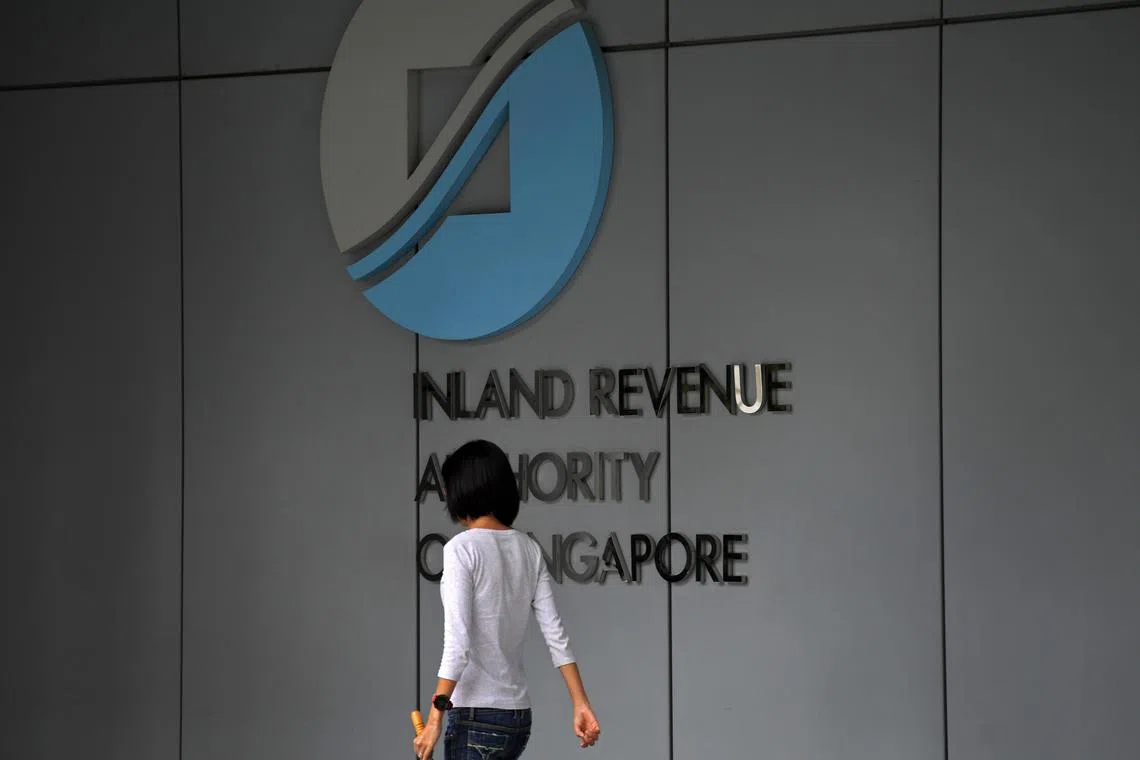$48m in additional tax bills issued in 2022 due to inaccurate claims made: Iras
Sign up now: Get ST's newsletters delivered to your inbox

Iras reminded taxpayers that it is an offence to make a wrongful tax relief claim, and penalties might be imposed.
PHOTO: ST FILE
SINGAPORE – Nearly 100,000 additional bills amounting to $48 million were issued to taxpayers in 2022 after they made incorrect tax relief claims, said the Inland Revenue Authority of Singapore (Iras).
The figure was up from $37 million of such bills issued in 2021, and $39 million in 2020.
Common reliefs erroneously claimed include child, parent and spouse relief. Most claimants did not meet the qualifying conditions, the taxman told The Straits Times last week.
“One common condition that was overlooked is the dependant’s – spouse, child or parent’s – income. If the dependants received annual income exceeding $4,000 in the previous year, reliefs are not allowable,” said Iras.
Meanwhile, a minority of erroneously claimed reliefs was due to duplicate claims made by two or more taxpayers for the same dependant.
“Tax reliefs such as Parent Relief and Child Relief may be shared among individuals based on an agreed apportionment if they are maintaining the same dependant and meet the qualifying conditions. However, the total relief claimed by all parties should not exceed the eligible amount,” Iras added.
It reminded taxpayers that it is an offence to make a wrongful tax relief claim, and penalties may be imposed.
“Taxpayers who realised they have made errors in their tax returns are encouraged to come forward to Iras voluntarily, in a timely manner, to correct their errors,” it said, adding that it is prepared to reduce penalties for such disclosures that meet qualifying conditions.
The 2023 tax-filing season started in March and will end on April 18 for e-filings.
Taxpayers should check if they meet the conditions for each relief by visiting go.gov.sg/taxreliefs or using the Personal Relief Checker on Iras’ website, before entering their claim in their tax forms on the myTax Portal.
If you forget to claim a relief, you can re-file once via the portal to make changes within seven days of e-filing your tax returns, before April 18. You can also file an amendment within 30 days of your tax bill’s date through the “Object to Assessment” digital service on the portal.
The total amount of personal income tax reliefs is subject to an overall cap of $80,000 for each year of assessment.
Here are some reliefs and rebates you may be eligible for in year of assessment (YA) 2023, which is for income earned from Jan 1 to Dec 31, 2022.
For individuals
You may claim Parent Relief of up to $18,000 or Handicapped Parent Relief of up to $28,000 for two dependants, if you have supported your parents, grandparents, parents-in-law or grandparents-in-law in Singapore, noted Iras.
You may share the relief with other family members, but the total relief claimed between you and your siblings should not exceed the relief allowable, added Iras.
If you are filing this claim, no other individuals are allowed to claim Spouse Relief/Handicapped Spouse Relief or Handicapped Brother/Sister Relief on your dependant parent.
You may also claim reliefs for making compulsory Central Provident Fund contributions if your employer is not under the Auto-Inclusion Scheme.
There is also a Course Fees Relief of up to $5,500 if you have attended courses, seminars or conferences that are relevant to your current employment, or lead to an approved academic, professional or vocation qualification.
Any amount paid or reimbursed by your employer or other organisations, or paid with SkillsFuture Credit, cannot be claimed, said Iras.
These reliefs are in addition to those that are automatically allowed if you are eligible – for example, you can get a relief of up to $8,000 for topping up your own CPF Special, Retirement or MediSave account, and the same amount for topping up your family members’ accounts.
You can also lower your tax bill through deductions for things like expenses incurred while working from home or running your business.
Ms Anna Low, head of personal tax and global mobility services at KPMG in Singapore, noted that these claims include electricity and telecommunication expenses based on how much one’s electricity bills have risen after working from home.
“If WiFi has been set up to enable working from home, employees may claim the monthly subscription fees as a deduction... If WiFi had been set up prior to the work-from-home arrangement, or if the individual is no longer required to work from home, no deduction can be claimed for such expenses,” she told ST.
The expenses must be divided among the working individuals in the same household if there is more than one person working from home, she added.
You can also enjoy tax deductions of 2½ times the qualifying donation amount if you have donated to an approved charity, said Iras.
Meanwhile, residential property landlords can claim tax deductions of 15 per cent of their gross rental income, or for actual expenses like repairs and maintenance of their rental property. They may also claim mortgage interest on the loan taken to purchase the tenanted property.
However, Ms Low noted that certain rental expenses are non-deductible. “This includes but is not limited to the repayments of the principal loan or mortgage amount, penalty for late payment or non-payment of property tax, cost of renovation, additions or alterations to the property.”
Taxpayers should know the reliefs they were eligible for the previous year will automatically be rolled over to the current year’s tax filing, added Ms Low. “They should check if they still qualify for such reliefs. Otherwise, the auto-included relief should be deleted.”
For married couples
You may claim Spouse Relief of $2,000 in YA2023 if you have supported your spouse and their total income was under $4,000 in 2022.
But if your spouse has a disability, you can claim Handicapped Spouse Relief of $5,500, even if they had income exceeding $4,000.
“No other claimant is allowed to claim Parent Relief/Handicapped Parent Relief, and Handicapped Brother/Sister Relief on your spouse if you claim Handicapped Spouse Relief,” said Iras.
For parents with dependant children
You may qualify for Parenthood Tax Rebate of up to $20,000 for Singaporean children born or adopted in 2022.
You and your spouse may share the rebate based on a distribution agreed by both of you, said Iras, adding that it will apportion the rebate equally if the percentage claimed does not add up to 100 per cent or both parties are unable to agree on the allocation.
Any unutilised rebate can be used to offset your income tax payable in subsequent years until it is fully used.
If you have supported your unmarried child, you may claim Qualifying Child Relief of $4,000 or Handicapped Child Relief of $7,500 per child, subject to some conditions.
You may share the reliefs on the same child with your spouse or former spouse based on an agreed apportionment, said Iras, adding that reliefs are not allowable if the dependant’s annual income exceeded $4,000 in the previous year.
If you are a working mother, you can claim up to 25 per cent of earned income for Singaporean children.
There is a $3,000 Grandparent Caregiver Relief if your parent, grandparent, parent-in-law or grandparent-in-law, including those of former spouses, helped take care of your children.
You can also claim twice the total foreign domestic worker levy paid in 2022 for one worker.
KPMG’s Ms Low noted that the relief is meant to encourage married women to stay in the workforce, so singles and married men are not eligible for it.
The relief also applies if you were separated from your husband, divorced or widowed, and had children who lived with you in 2022 for whom you can claim child reliefs.



